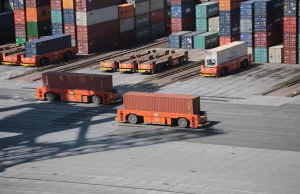The shipping industry has been traditionally known to be slow-paced and traditional in its approach. However, it’s now in the midst of a technological revolution with innovations fast transforming the sector. FreightTech, a term used for technology that improves the shipping and logistics industry, is changing the way shipping companies handle their transport, logistics, and supply chain management. From predictive analytics that help improve accuracy and efficiency of supply chain operations to autonomous vehicles and drones that are fast becoming a reality, the industry has been disrupted.
In this blog post, we will discuss the top five FreightTech innovations that have revolutionized the shipping industry. Each of these innovations offers a unique solution to persistent problems in the freight and logistics space. By embracing these technologies, carriers, shippers, and logistics companies can streamline their operations, reduce costs, enhance safety, and increase efficiency. We’ll take a closer look at the technology and how they are transforming the shipping industry. Join us as we delve deeper into the world of FreightTech and
1. Automation Of Supply Chain Processes
The automation of supply chain processes has emerged as a significant FreightTech innovation that is revolutionizing the shipping industry. With rapid advancements in robotics and other technologies, many freight companies are automating their operations to increase efficiency and reduce costs. Automation can help to streamline logistics processes, which include everything from scheduling and routing to inventory management, order processing, and shipment tracking. This technology can also eliminate manual errors and allow companies to maintain real-time visibility throughout the supply chain, from the supplier to the end customer. While there is always a need for human intervention, the integration of automation technology promises to improve supply chain reliability, speed, and reduce costs over time.
2. Real-Time Tracking And Transparency
Real-time tracking and transparency is an innovation that has revolutionized the shipping industry by providing more visibility and control over freight operations. Given the complexity of modern supply chains, real-time tracking has become an essential tool that offers shippers, carriers, and logistics providers the ability to monitor their cargo movements at any point during their shipment. This technology allows users to receive up-to-date information about their shipments, including pick-up times, delivery estimates, and any delays encountered during transport. With more transparency, elusive issues such as miscommunication missed deadlines, and erroneous delivery becomes less prevalent, as stakeholders can keep track of their freight’s progress and take corrective action if necessary. Furthermore, this innovation has resulted in fewer lost packages and faster delivery times, making it one of the most significant developments in the shipping industry.
3. Advanced Analytics And Predictive Insights
In an era of digitalization, data-driven decision-making has dramatically transformed the shipping industry. Advanced analytics and predictive insights, including the use of a digital bill of lading, are among the top FreightTech innovations revolutionizing the shipping industry. The proliferation of big data has enabled the industry to harness and leverage data to improve operational efficiency, decision-making, and strategy. Advanced analytics provide shippers with real-time visibility into their freight movements, allowing them to identify issues early on and take proactive measures. Predictive insights use machine learning algorithms to identify patterns and predict future outcomes, enabling shippers to make informed decisions faster. These technologies, including the utilization of a digital bill of lading, are transforming traditional shipping practices, streamlining operations, and enabling freight companies to make data-driven decisions that improve their bottom line. The potential for these innovations is vast and is expected to continue to transform the shipping industry in the years to come.
4. Automated Cargo Routing
Automated cargo routing is a rapidly growing FreightTech innovation that is revolutionizing the shipping industry by streamlining cargo routing and reducing transportation costs. Autonomous routing systems use advanced algorithms, data analytics, and real-time tracking to map the most efficient way to transport freight based on factors like weather, traffic, fuel consumption, and delivery times. As a result, automated routing systems are making freight transportation more efficient, sustainable, and cost-effective. With real-time analytics and machine learning to increase the accuracy of projections, automated cargo routing enables companies to optimize their logistics operations and reduce their carbon footprint. As the supply chain evolves, automated cargo routing is poised to transform the shipping industry by reducing delays and speeding up deliveries, allowing companies to improve overall efficiency and profitability.
5. Improved Safety And Compliance
One of the top five FreightTech innovations revolutionizing the shipping industry is improved safety and compliance. The integration of intelligent technologies in freight transportation systems has enhanced safety measures and regulatory compliance standards. Fleet managers can monitor the movements of their vehicles and drivers in real time, using GPS and telematics technology, to ensure that safety protocols are being upheld. Additionally, machine learning algorithms and predictive analytics allow for the identification of potential driving and safety hazards before they become a dangerous issues for dispatchers and drivers. The implementation of digital systems that track goods and shipments also ensures regulatory compliance with customs, safety, and environmental standards, reducing the risk of legal sanctions and penalties. FreightTech companies that prioritize safety and compliance measures can improve overall efficiency and profitability, while also reducing accidents and legal risks.
In conclusion, the freight industry is being transformed by a handful of innovative technologies that are revolutionizing how companies transport goods around the world. From blockchain and AI to drones and driverless trucks, these tools are helping to streamline supply chains, increase efficiency, and drive down costs. While some of these technologies are still in their infancy, it’s clear that they will play an increasingly important role in the years to come, reshaping the freight industry and helping businesses stay competitive in a rapidly evolving global marketplace.














